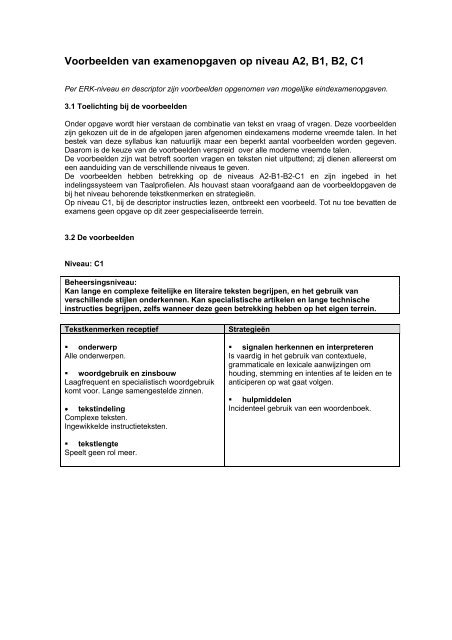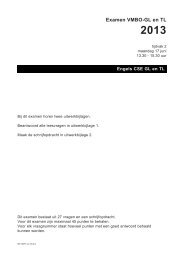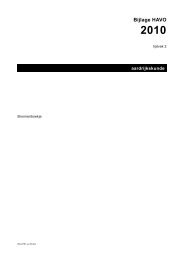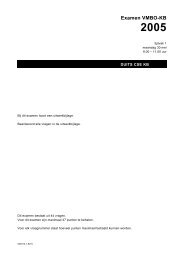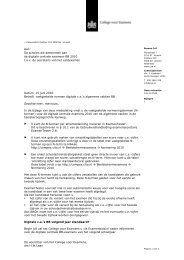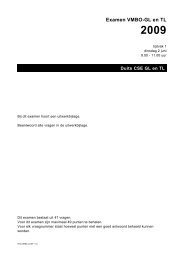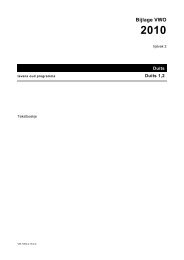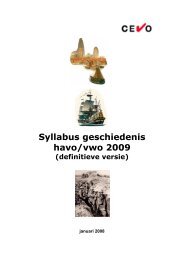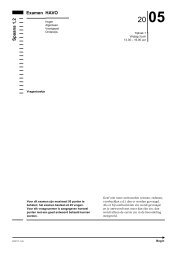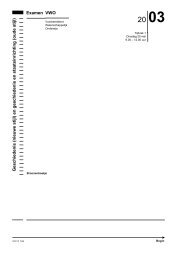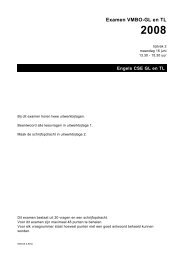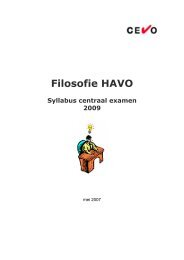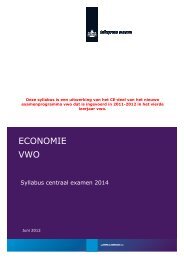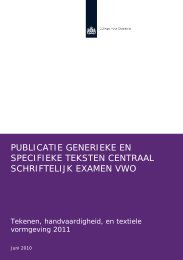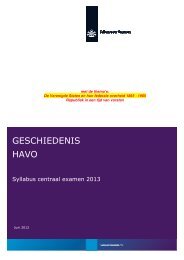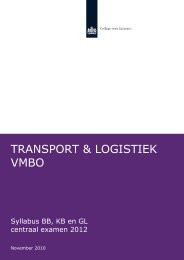Voorbeelden van examenopgaven ERK-niveau C1 - Examenblad.nl
Voorbeelden van examenopgaven ERK-niveau C1 - Examenblad.nl
Voorbeelden van examenopgaven ERK-niveau C1 - Examenblad.nl
You also want an ePaper? Increase the reach of your titles
YUMPU automatically turns print PDFs into web optimized ePapers that Google loves.
<strong>Voorbeelden</strong> <strong>van</strong> <strong>examenopgaven</strong> op <strong>niveau</strong> A2, B1, B2, <strong>C1</strong><br />
Per <strong>ERK</strong>-<strong>niveau</strong> en descriptor zijn voorbeelden opgenomen <strong>van</strong> mogelijke eind<strong>examenopgaven</strong>.<br />
3.1 Toelichting bij de voorbeelden<br />
Onder opgave wordt hier verstaan de combinatie <strong>van</strong> tekst en vraag of vragen. Deze voorbeelden<br />
zijn gekozen uit de in de afgelopen jaren afgenomen eindexamens moderne vreemde talen. In het<br />
bestek <strong>van</strong> deze syllabus kan natuurlijk maar een beperkt aantal voorbeelden worden gegeven.<br />
Daarom is de keuze <strong>van</strong> de voorbeelden verspreid over alle moderne vreemde talen.<br />
De voorbeelden zijn wat betreft soorten vragen en teksten niet uitputtend; zij dienen allereerst om<br />
een aanduiding <strong>van</strong> de verschillende <strong>niveau</strong>s te geven.<br />
De voorbeelden hebben betrekking op de <strong>niveau</strong>s A2-B1-B2-<strong>C1</strong> en zijn ingebed in het<br />
indelingssysteem <strong>van</strong> Taalprofielen. Als houvast staan voorafgaand aan de voorbeeldopgaven de<br />
bij het <strong>niveau</strong> behorende tekstkenmerken en strategieën.<br />
Op <strong>niveau</strong> <strong>C1</strong>, bij de descriptor instructies lezen, ontbreekt een voorbeeld. Tot nu toe bevatten de<br />
examens geen opgave op dit zeer gespecialiseerde terrein.<br />
3.2 De voorbeelden<br />
Niveau: <strong>C1</strong><br />
Beheersings<strong>niveau</strong>:<br />
Kan lange en complexe feitelijke en literaire teksten begrijpen, en het gebruik <strong>van</strong><br />
verschillende stijlen onderkennen. Kan specialistische artikelen en lange technische<br />
instructies begrijpen, zelfs wanneer deze geen betrekking hebben op het eigen terrein.<br />
Tekstkenmerken receptief Strategieën<br />
onderwerp<br />
Alle onderwerpen.<br />
woordgebruik en zinsbouw<br />
Laagfrequent en specialistisch woordgebruik<br />
komt voor. Lange samengestelde zinnen.<br />
• tekstindeling<br />
Complexe teksten.<br />
Ingewikkelde instructieteksten.<br />
tekstlengte<br />
Speelt geen rol meer.<br />
signalen herkennen en interpreteren<br />
Is vaardig in het gebruik <strong>van</strong> contextuele,<br />
grammaticale en lexicale aanwijzingen om<br />
houding, stemming en intenties af te leiden en te<br />
anticiperen op wat gaat volgen.<br />
hulpmiddelen<br />
Incidenteel gebruik <strong>van</strong> een woordenboek.
<strong>C1</strong> Correspondentie<br />
lezen<br />
The Guardian<br />
Kan alle correspondentie<br />
begrijpen als incidenteel een<br />
woordenboek gebruikt kan<br />
worden<br />
Teaching’s<br />
true vocation<br />
Engels<br />
Hieronder staan vijf uitspraken. Twee er<strong>van</strong> geven elk een opvatting weer <strong>van</strong> één <strong>van</strong> de<br />
twee briefschrijvers.<br />
1 Practical training is ultimately the o<strong>nl</strong>y useful thing in education.<br />
2 Pupils do not realise the rele<strong>van</strong>ce of academic subjects.<br />
3 Recently introduced school subjects do not deserve to be called academic.<br />
4 School subjects should be approached from an academic as well as a practical perspective.<br />
5 Teachers are reluctant to experiment with new approaches in education.<br />
Noteer de naam <strong>van</strong> de twee briefschrijvers, gevolgd door het nummer <strong>van</strong> de<br />
uitspraak die zijn/haar opvatting weergeeft.
<strong>C1</strong> Oriënterend<br />
lezen<br />
Kan lange en complexe teksten snel<br />
scannen en rele<strong>van</strong>te details vinden<br />
Reference works Engels<br />
Je zoekt een boek over de invloed <strong>van</strong> het toenemende materialisme in de Amerikaanse<br />
same<strong>nl</strong>eving.<br />
Wordt er in de bibliografie een boek genoemd waarin dit onderwerp aan de orde is?<br />
Zo nee, antwoord ”nee”. Zo ja, noteer de titel <strong>van</strong> het boek.
<strong>C1</strong> Lezen om<br />
informatie<br />
op te doen<br />
Quiet, please<br />
Kan een breed scala aan lange en complexe<br />
teksten zoals men die tegenkomt in het sociale,<br />
professionele en academische leven tot in detail<br />
begrijpen waarbij fijnere details zoals attitudes<br />
en opinies, impliciet en expliciet verwoord,<br />
worden onderkend.<br />
MODERN TIMES ▲ DAVID THOMPSON<br />
Quiet,<br />
please<br />
Engels<br />
“Far from being the mere absence of sound, silences express what no words or sounds possibly<br />
could.” Stephen Kern, The Culture of Time and Space, 1880-1918 (1983)<br />
1 One of music’s most interesting qualities, perhaps a transcendental quality, is its ability to suggest the<br />
intangible, to imply and articulate ideas and experiences that lie beyond the reach of language, imagery<br />
and mathematics. The prerequisite of all music is silence, and silence, too, has expressive possibilities<br />
that defy easy explanation.<br />
2 The Viennese composer Anton Webern produced curiously miniaturised music that underlines a<br />
deliberate use of silence as more than a mere absence or zero value. Webern’s one-minute movements<br />
evoke tension by implying notes not heard, as if the music had been chiselled away or shaped using a<br />
holepuncher. Silent pauses can lend dramatic performance poignancy and emotional charge, and the<br />
duration of such pauses can radically alter not o<strong>nl</strong>y the effectiveness of the delivery, but also its<br />
dramatic significance.<br />
3 In many social gatherings, non-verbal interludes can provoke awkwardness and, in some cases,<br />
acute anxiety. Much of the best humour relies on a precise timing of silence. Even newspaper cartoon<br />
strips use wordless or inanimate frames to evoke meaning and heighten impact. When delivering a<br />
punch line it may indeed pay to mind the gap.<br />
4 Urban centres now offer their inhabitants or visitors endless encounters with vibrating air, welcome or<br />
otherwise. The freedom to experience heavily amplified rhythm tracks with visceral intensity in the<br />
comfort of one’s home or car may be more accessible than ever before, but the cost of this freedom is<br />
often paid by others who would rather not have access to that same thump, rumble and hiss.<br />
5 Garbled in the translation from the desert highways of North America to our own small island, the<br />
unqualified liberties of car ownership have resulted in sprawling webs of congealed traffic; a crawling<br />
visual and auditory litter, punctuated by fits of temper and deranged car-horn semaphore. Police<br />
stations have had to evolve specialised nocturnal teams in an attempt to deal with that ultimate aural<br />
blasphemy, the car alarm. For city dwellers, few evenings now pass without a shrill and piercing chorus<br />
of tinny, battery-powered tones and electronic whining. The club-goers’ late-night urge for junk food<br />
seems to have inspired McDonald’s to furnish some of their garish stop-’n’-troughs with a five-kilowatt<br />
PA rig, each one presumably calibrated to the precise decibel level necessary to obliterate their<br />
customers’ better judgement.<br />
6 It’s far too easy to imagine a near future in which the most luxurious treat would be a weekend spent<br />
cocooned in silence deep within some heavily insulated underground bunker, untroubled by the<br />
epidemic of monotonous thudding music and its ironic, endlessly re-triggered shrieks of “peace and<br />
harmony”.<br />
7 One of Bertrand Russell’s “Unpopular Essays”, published in 1950, includes the prophetic assertion:<br />
“A mentally solitary life seems pointless according to modern standards …. We are suffering not from<br />
the decay of theological beliefs but from the loss of solitude.” As the number of external stimuli vying for<br />
our attention increases, occupying ever more physical and psychological space with escalating<br />
overstatement and intensity, the freedoms of silence seem largely overlooked. The personal space and<br />
isolation required for almost any creative consideration are easily compromised and difficult to reassert.<br />
8 Introspective pauses are uncommon to western sensibilities and, more than ever, meditative<br />
moments free from interruption seem pointedly unfashionable. For anyone under the age of 30,<br />
subtracting oneself from the buzz of social activity is typically viewed as an eccentricity or sign of<br />
alarming maladjustment. One is obliged to be at all times “up for it”. This may help explain the<br />
coarsening of judgement now apparent in so many areas of our culture.<br />
9 Brian Eno once suggested that music would continue to spread relentlessly and unchallenged into<br />
all aspects of life, becoming ubiquitous background noise. Presumed, unvalued and unnoticed, music
would ultimately be “invisible” to the conscious ear. This nightmarish vision of the future invites a<br />
number of questions. Exactly what kind of irreparable sensory numbing would be necessary to render<br />
even our current pandemonium inaudible? If we are to be immersed in perpetual noise, perversely<br />
sedated by endless diversions, will anyone ask: from what are we being diverted?<br />
David Thompson is a musician and writer<br />
‘New Statesman’, November 20, 1998<br />
Which of the following is the point made in paragraphs 1–2?<br />
A Music can o<strong>nl</strong>y be appreciated in the absence of distracting noise.<br />
B Silence is an integral part of what music is meant to convey.<br />
C The effect of silence may last longer than that of music.<br />
DThe perception of silence depends on the occurrence of sound.<br />
Which of the following is in line with the first sentence of paragraph 3?<br />
A Many people are more inclined to remain silent than to speak.<br />
B Silence can be an important instrument in human interaction.<br />
C Silence in conversations may make people feel uncomfortable.<br />
D Silent people may be considered to lack social grace.<br />
‘it may indeed pay to mind the gap’ (eind alinea 3).<br />
Leg uit wat, gelet op de inhoud <strong>van</strong> alinea 3, met deze zinsnede bedoeld wordt.<br />
De vierde alinea bevat woorden als ‘vibrating air’, ‘thump, rumble and hiss’.<br />
Welke opvatting brengt de schrijver tot uitdrukking met deze woordkeus?<br />
What does paragraph 5 focus on?<br />
A Life in Britain being conditioned by the irritating habits of the young.<br />
B The effects of overcrowding of the British isles.<br />
C The intrusion of noise into many areas of British life.<br />
D The irreversibility of the American influence on the way of life in Britain.<br />
Leg uit wat volgens David Thompson ‘ironic’ (alinea 6) is.<br />
Which of the following is the point made in paragraph 7?<br />
A Isolation is a recent phenomenon, totally contrary to modern man’s deepest longings.<br />
B Modern man has to find new inspiration in order to achieve peace of mind.<br />
C The loss of traditional values has caused modern man to hold originality in low esteem.<br />
D The preoccupation with leisure is symptomatic of man’s stressful existence.<br />
E The strong hold of the outside world on modern man chokes imaginative thought.<br />
‘One is obliged to be at all times “up for it”.’ (alinea 8)<br />
Geef door middel <strong>van</strong> een citaat aan waarvoor men altijd klaar zou moeten staan.<br />
Welk beeld bedoelt de schrijver met ‘This nightmarish vision of the future’ in de laatste<br />
alinea?


